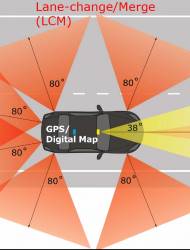
The European GNSS Agency (GSA) has extended its timeline, until November 20, for submission of proposals to develop two specialized European GNSS (E-GNSS) “engines” for ITS applications.
The European GNSS Agency (GSA) has extended its timeline, until November 20, for submission of proposals to develop two specialized European GNSS (E-GNSS) “engines” for ITS applications.
Partly funded under its €100 million “Fundamental Elements” program, the projects would build Galileo and European Geostationary Navigation Overlay Service (EGNOS) capability into specialized chipsets: an E-GNSS engine for safety-critical applications in road transportation and another for liability- and payment -critical applications in road transportation. Target participants are vehicle manufacturers, automotive suppliers, and GNSS receiver and chipset manufacturers.
The first grant would underwrite up to 60 percent (€4.5 million) of a single project to develop an engine for safety-critical ITS applications, while also analyzing the potential for E-GNSS “differentiators” (such as signal authentication, precise point positioning using a Commercial Service), developing the interface with a vehicle’s standard data exchange system (such as a CAN bus), and cooperating with GNSS/ITS standardization efforts.
The second grant would provide €6 million for two similar projects to help develop a “liability- and payment-critical E-GNSS-based engine in the road sector.” All three projects would run for up to three years and focus on creating chipsets that would be embedded in dedicated on-board units, on vehicles or consumer devices on private and commercial road vehicles.
The safety-critical engine should address multiple safety-critical applications, such as advanced driver assistance systems (ADAS), anti-collision based on vehicle-to-infrastructure (V2X) communications, autonomous vehicles, transport of dangerous goods, and so forth.
The liability and payment-critical engine would be designed to support “applications for which a high level of liability risk or economic consequences ensue in case of a malfunction or non-availability of GNSS signals” — for example, speed control and enforcement, digital tachograph, accident reconstruction, dangerous goods tracing, road charging, pay-as-you-drive insurance.
The E-GNSS engines would include a GNSS chipset/receiver, but also the additional software and hardware parts and vehicle standard interfaces, if needed, that would allow the final calculation of the location. The E-GNSS engine can use hybridization techniques that interact with non-GNSS based positioning technologies.
Details of the call for proposals and submission of proposals can be found on the GSA website here.
The Fundamental Elements program is part of an overall strategy of market uptake initiatives led by the GSA and in accordance with European Union (EU) regulations.
“For the first time, EU Regulation provides a financing tool for the market uptake of European GNSS chipsets and receivers,” says GSA Executive Director Carlo des Dorides. “The GSA will be instrumental in ensuring that the new Fundamental Elements program contributes to the successful integration of Galileo and EGNOS.”
According to the GSSA, the Fundamental Elements program complements the EU’s Horizon 2020 research program. “While Horizon 2020 funding aims to foster Galileo and EGNOS adoption via content and application development, Fundamental Elements projects will focus on supporting the development of innovative chipset and receiver technologies,” says a GSA press release on the program.
The GSA manages the Fundamental Elements program on behalf of the European Commission.





